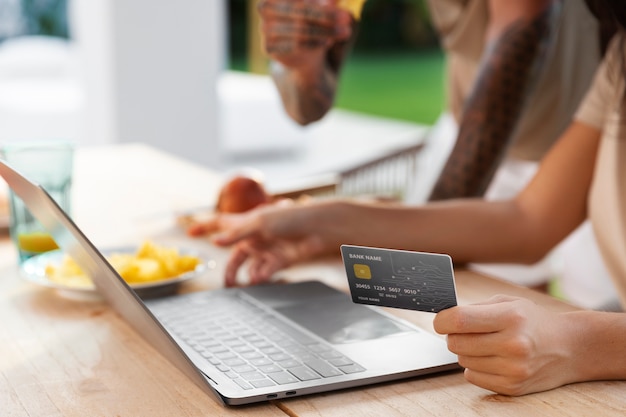Cybersecurity Standards in Online Payments
As the technology evolved, so did our habits, and as a result, so did our shopping habits. Online shopping has many advantages, is convenient and quick, but it is not as trusted as in-store shopping. Customers are unaware of the entire purchase and payment process, but they want to feel safe. As a merchant, you must do everything possible to make your customers feel safe throughout the purchasing process.

How to do that? Choose a secure payment gateway!
Securing online transactions should and most likely is the top priority for eCommerce merchants, especially now that data breaches are more common and frightening than ever.
If you own or work for an eShop, make sure your payment gateway offers the appropriate security solutions and features. Transaction security is complicated, but you must keep up. A payment gateway should enable you to accept any online payment without having to worry about security. If not, you should reconsider your payment gateway options.
The purpose of this article is to shed some light on what to look for in a payment gateway. If your payment gateway does not meet these requirements, please consider switching.
1. PCI DSS - Payment Card Industry Data Security Standards
According to Wikipedia, "the PCI Standard is mandated by the card brands and administered by the Payment Card Industry Security Standards Council." The standard was developed to tighten controls around cardholder data in order to reduce credit card fraud."
According to the PCI Data Security Standard, there are twelve requirements for compliance, which are divided into six groups of goals.
I. Build and Maintain a Secure Network
1. Configure and maintain a firewall to protect cardholder data.
2. Never use vendor-supplied defaults for system passwords and other security parameters.
II. Protect Cardholder Data
3. Safeguard stored cardholder data
4. Encrypt cardholder data transmission across open, public networks.
III. Maintain a Vulnerability Management Program
5. Use and keep anti-virus software or programs up to date.
6. Create and keep secure systems and applications.
IV. Implement Strong Access Control Measures
7. Limit access to cardholder data to those with a business need-to-know.
8. Assign a unique ID to each person who has access to the computer.
9. Limit physical access to cardholder information.
V. Regularly Monitor and Test Networks
10. Track and monitor all network resources and cardholder data access.
11. Test security systems and processes on a regular basis.
VI. Maintain an Information Security Policy
12. Maintain an information security policy for employees and contractors.
As you can see, there are a lot of requirements to meet but don't worry, the fun part is about to begin: a merchant does not have to be PCI compliant if they use the right payment gateway provider. A secure gateway, such as SifiPay, provides PCI level 1; thus, the eShop can rely on it for PCI DSS compliance.

2. P2PE - Point-to-point encryption
When selecting payment gateway solutions, you should also consider encryption standards. When it comes to your customer's sensitive data, you'll want to avoid any breach that could harm your company's reputation.
P2PE is also a Payment Card Industry (PCI) standard, with the goal of ensuring payment security solutions that instantly convert payment card data into coded data to prevent fraud or hacking.
In an increasingly complex regulatory environment, this standard is intended to maximize the security of payment card transactions. A payment solution provider must include the following in order to comply with the P2PE standard:
1. At-point-of-interaction (POI) secure encryption of payment card data
2. Validated P2PE application at the point of interaction
3. Encryption and decryption device management that is secure
4. Possession of the decryption environment as well as all decrypted account data
5. Implementation of secure encryption methodologies and cryptographic key operations, such as key generation, distribution, loading/injection, administration, and usage.
However, using a valid P2PE payment solution does not eliminate the need for PCI DSS in the merchant environment.
By selecting a payment gateway provider that supports P2PE, you and other merchants can breathe easier. It reduces the risk of data loss and protects your company's reputation, as well as avoiding potential compliance failure fines or lost revenue from fraud.
3. Tokenization
Tokenization is another of these standards that adds another layer of security. Tokenization is the process of replacing sensitive data with an equivalent that has no exploitable meaning or value. This non-sensitive data is referred to as a token. For the entire tokenization process to work, the payment gateway must store data that allows the token to be generated at random.
Fundamentally, tokenization secures sensitive data in a virtual vault, such as a banking account or credit card number, by converting it into meaningless data that external threats cannot exploit. Without fear of unintended consequences, the data can be shared over wireless networks.
Tokenization is a necessary process for eCommerce and should be included in the payment process, particularly for merchants who accept recurring payments or subscriptions. It is also an essential component for eShops that accept one-click payments.
As previously stated, transaction security is complicated; however, we encourage you to check if your gateway meets these standards; if not, you should demand that it do so. SifiPay recognizes the importance of security in eCommerce and has built our payment gateway to meet all of these requirements. If you want to learn more about our commitment to security, you can do so here, or we can meet for coffee and talk more.
Advertise on APSense
This advertising space is available.
Post Your Ad Here
Post Your Ad Here
Comments